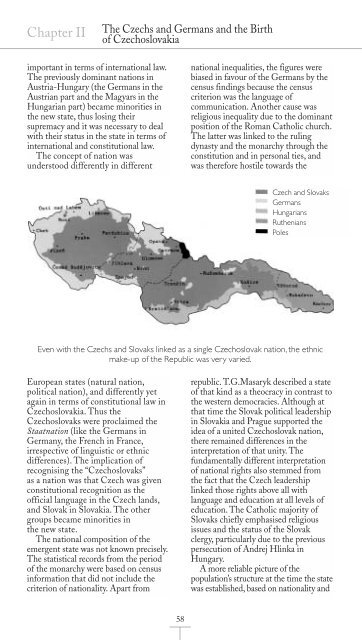the nationality of all inhabitants of the czech provinces and ...
the nationality of all inhabitants of the czech provinces and ...
the nationality of all inhabitants of the czech provinces and ...
Create successful ePaper yourself
Turn your PDF publications into a flip-book with our unique Google optimized e-Paper software.
Chapter II<br />
important in terms <strong>of</strong> international law.<br />
The previously dominant nations in<br />
Austria-Hungary (<strong>the</strong> Germans in <strong>the</strong><br />
Austrian part <strong>and</strong> <strong>the</strong> Magyars in <strong>the</strong><br />
Hungarian part) became minorities in<br />
<strong>the</strong> new state, thus losing <strong>the</strong>ir<br />
supremacy <strong>and</strong> it was necessary to deal<br />
with <strong>the</strong>ir status in <strong>the</strong> state in terms <strong>of</strong><br />
international <strong>and</strong> constitutional law.<br />
The concept <strong>of</strong> nation was<br />
understood differently in different<br />
European states (natural nation,<br />
political nation), <strong>and</strong> differently yet<br />
again in terms <strong>of</strong> constitutional law in<br />
Czechoslovakia. Thus <strong>the</strong><br />
Czechoslovaks were proclaimed <strong>the</strong><br />
Staatnation (like <strong>the</strong> Germans in<br />
Germany, <strong>the</strong> French in France,<br />
irrespective <strong>of</strong> linguistic or ethnic<br />
differences). The implication <strong>of</strong><br />
recognising <strong>the</strong> “Czechoslovaks”<br />
as a nation was that Czech was given<br />
constitutional recognition as <strong>the</strong><br />
<strong>of</strong>ficial language in <strong>the</strong> Czech l<strong>and</strong>s,<br />
<strong>and</strong> Slovak in Slovakia. The o<strong>the</strong>r<br />
groups became minorities in<br />
<strong>the</strong> new state.<br />
The national composition <strong>of</strong> <strong>the</strong><br />
emergent state was not known precisely.<br />
The statistical records from <strong>the</strong> period<br />
<strong>of</strong> <strong>the</strong> monarchy were based on census<br />
information that did not include <strong>the</strong><br />
criterion <strong>of</strong> <strong>nationality</strong>. Apart from<br />
The Czechs <strong>and</strong> Germans <strong>and</strong> <strong>the</strong> Birth<br />
<strong>of</strong> Czechoslovakia<br />
58<br />
national inequalities, <strong>the</strong> figures were<br />
biased in favour <strong>of</strong> <strong>the</strong> Germans by <strong>the</strong><br />
census findings because <strong>the</strong> census<br />
criterion was <strong>the</strong> language <strong>of</strong><br />
communication. Ano<strong>the</strong>r cause was<br />
religious inequality due to <strong>the</strong> dominant<br />
position <strong>of</strong> <strong>the</strong> Roman Catholic church.<br />
The latter was linked to <strong>the</strong> ruling<br />
dynasty <strong>and</strong> <strong>the</strong> monarchy through <strong>the</strong><br />
constitution <strong>and</strong> in personal ties, <strong>and</strong><br />
was <strong>the</strong>refore hostile towards <strong>the</strong><br />
Czech <strong>and</strong> Slovaks<br />
Germans<br />
Hungarians<br />
Ru<strong>the</strong>nians<br />
Poles<br />
Even with <strong>the</strong> Czechs <strong>and</strong> Slovaks linked as a single Czechoslovak nation, <strong>the</strong> ethnic<br />
make-up <strong>of</strong> <strong>the</strong> Republic was very varied.<br />
republic. T.G.Masaryk described a state<br />
<strong>of</strong> that kind as a <strong>the</strong>ocracy in contrast to<br />
<strong>the</strong> western democracies. Although at<br />
that time <strong>the</strong> Slovak political leadership<br />
in Slovakia <strong>and</strong> Prague supported <strong>the</strong><br />
idea <strong>of</strong> a united Czechoslovak nation,<br />
<strong>the</strong>re remained differences in <strong>the</strong><br />
interpretation <strong>of</strong> that unity. The<br />
fundament<strong>all</strong>y different interpretation<br />
<strong>of</strong> national rights also stemmed from<br />
<strong>the</strong> fact that <strong>the</strong> Czech leadership<br />
linked those rights above <strong>all</strong> with<br />
language <strong>and</strong> education at <strong>all</strong> levels <strong>of</strong><br />
education. The Catholic majority <strong>of</strong><br />
Slovaks chiefly emphasised religious<br />
issues <strong>and</strong> <strong>the</strong> status <strong>of</strong> <strong>the</strong> Slovak<br />
clergy, particularly due to <strong>the</strong> previous<br />
persecution <strong>of</strong> Andrej Hlinka in<br />
Hungary.<br />
A more reliable picture <strong>of</strong> <strong>the</strong><br />
population’s structure at <strong>the</strong> time <strong>the</strong> state<br />
was established, based on <strong>nationality</strong> <strong>and</strong>


